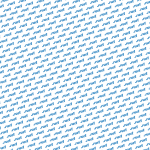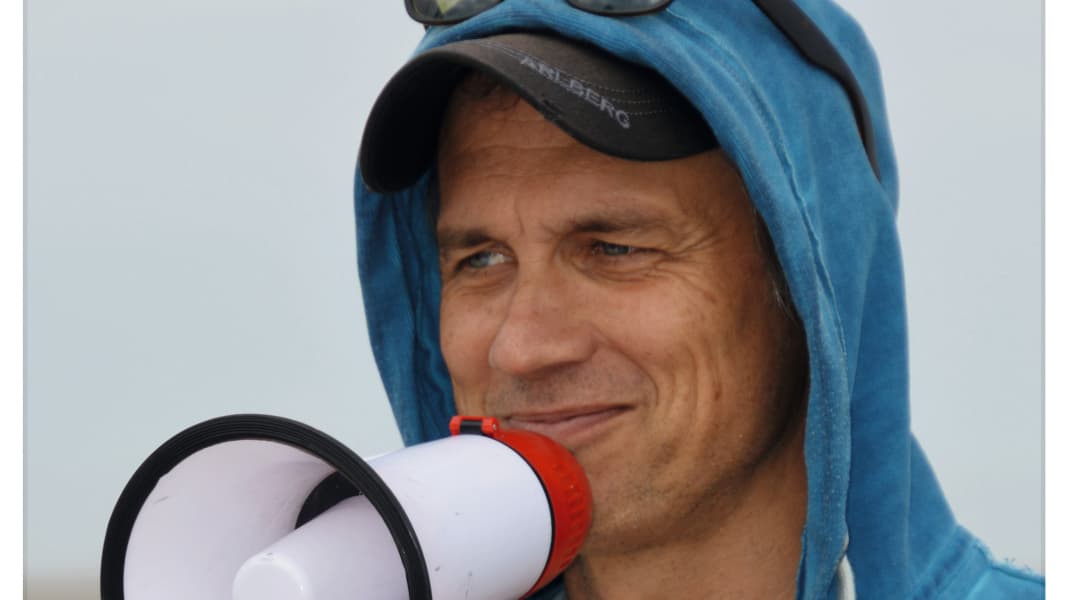
In the mid-90s, Ralf Bauer brought surfing into millions of German living rooms as Beau in the ARD TV series "Against the Wind". The ladies were delighted, the surfing community divided. And the surf schools experienced a "Bauer boom". Quite a few people who are on the water today started surfing back then.
Now Bauer is returning to St. Peter-Ording with his first own film "Die Wiederkehr - SEM DHUL", which can already be seen online ( www.vimeo.com/ondemand/diewiederkehr ) and will go on a drive-in cinema tour in Germany from autumn/winter 2021 ( www.ralfbauer.info ). Christian Kohl, who had doubled the actor in "Against the Wind", met Bauer again after more than 20 years. In a very personal interview, Ralf Bauer reveals to his former double why the project is a new start, what has happened in the meantime and what role surfing plays in it.
Nice to see you again, even if only via video stream. I'm curious: What's your film about?
Ralf:It is the story of Ralf, who fights against the Chinese regime in India as an escape helper for Tibetans, and his childhood friend Tonio, who wants to motivate him to travel back to his German homeland of St. Peter-Ording to save a mutual childhood friend. Against the impressive backdrop of the Himalayan mountains and the North Sea, the film is also about an investor versus a surfer's paradise, windsurfers versus kiters, ego versus compassion and young versus old.
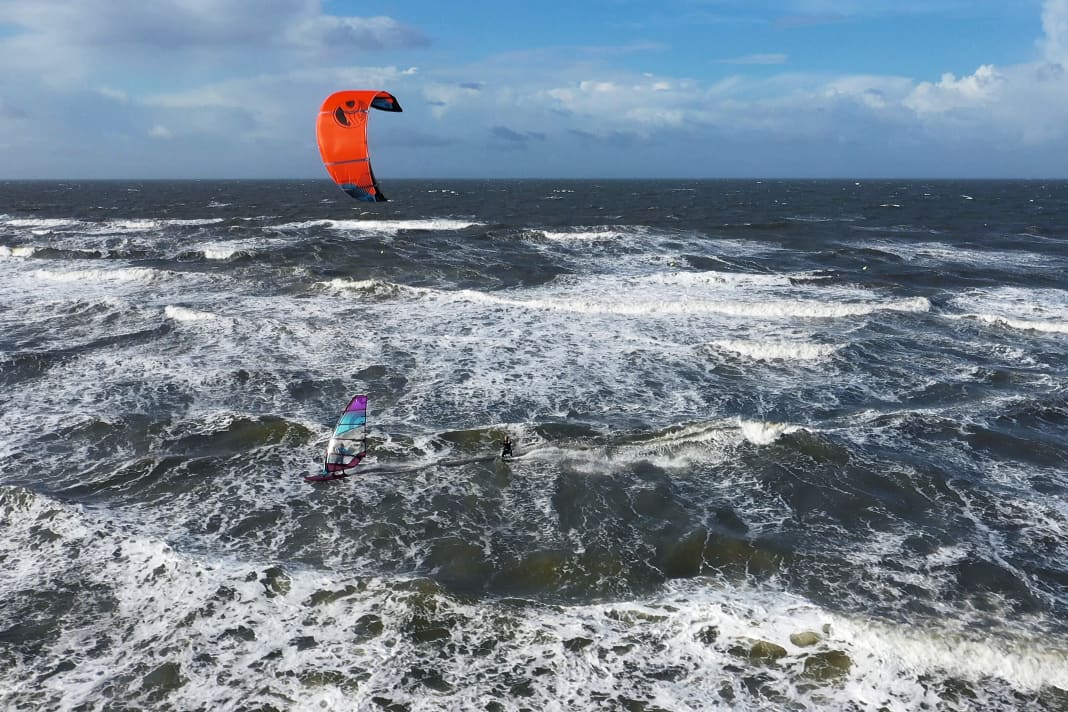





This is far from just a fun topic, it also sounds very political. How did you come up with it?
Before the coronavirus pandemic, I collected donations in Germany several times together with a Tibetan monk friend and took them to refugee camps in India. When you know Tibetans and see what peaceful, wonderful people they are and what is being done to them in their homeland, it's really frightening. I was invited to an event in Dharamslala, the place where the Dalei Lama lives, and I didn't understand a word he was saying. But there I had an idea and an image in my head of Antonio Putignano perched on the back of a donkey and riding up into this barren mountain world of Tibet, with a Tibetan monastery in the background - so I spun a story around it. It was also exciting for me that the ideas of Tibetan monks - this connection with nature and "resting in oneself" - are basically very similar to the philosophy of many surfers.
Fellow actor Antonio Putignano is probably still known to some as "Rocky" from "Against the Wind". Will there be more reunions with colleagues from back then in "The Return"?
Actually only with Antonio Putignano and me - we've always stayed in touch. He's like an Italian brother to me and I can't get rid of him.
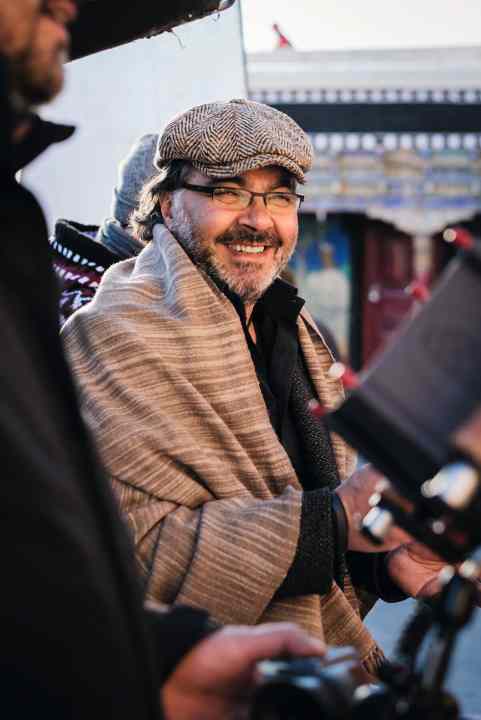
And what about your former series partner Hardy Krüger Jr.
It was more of a side-by-side relationship, we sometimes met up, even spoke on the phone a few times, but more and more we lost sight of each other rather than continuing on the path together. Perhaps interesting for surfers: Back then, I was also in contact with "real" surfing greats, such as Robby Naish, who I also met from time to time and who could still remember me. I actually wanted to get him to make a small guest appearance in "The Return". That didn't work out, but I was able to convince world champion Vincent Langer - and he mastered his scene brilliantly as a "one taker", i.e. in his first attempt.
The North Sea and the Himalayan mountains sound visually very appealing. Did you actually film in both places?
Yes, we filmed in Ladakh in northern India. That used to be part of Tibet. Director Jean-Jacques Annaud wanted to shoot "Seven Years in Tibet" with Brad Pitt there, but he wasn't allowed to. And Martin Scorsese wanted to shoot "Kundun" there and wasn't allowed to either. As you can imagine, if these two huge directors wanted to shoot there, it's a phenomenal setting. And I was lucky enough, thanks to my contact with the Tibetans, that the monks organised everything for us there and we were allowed to shoot there.
You controlled a lot of the production yourself. In addition to acting, you were heavily involved in your team, from sound mixing to colour grading. Why was that?
In such a creative process, everyone has their own particular idea and what I didn't want to do was make a typical German film. I wanted to make something different. I don't know if I succeeded, but I hope I did. Of course, the limited budget also played a role. We had to be creative in order to realise everything. Fortunately, we were able to win VW as a supporter, who not only provided vehicles for the shoot, but also a "Hotel California" with Bullies in which some of the film crew could sleep in St Peter.
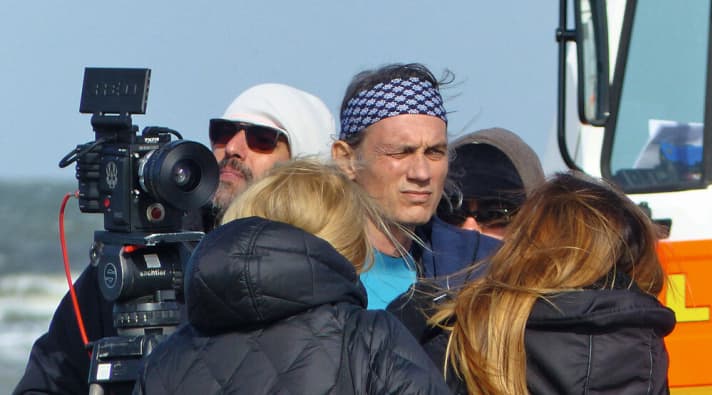
Who supported you with the surf recordings?
Why support? (laughs).
I don't assume that you've done the surfing recordings on your own in the meantime, even though I know that you learnt to surf for "Against the Wind" and had fun doing it.
I still have it. But it's almost impossible to catch up on what you were able to do back then for someone who started surfing late... Worldcupper Nico Prien doubled me this time and Niclas Nebelung. Kite pro Marian Hund took the kitesurfing shots. Flessi (editor's note: Bernd Flessner) coordinated everything in his usual chaos - he's always on the go. Nico, Niclas and Marian really fought their way through it. We only started filming in St. Peter-Ording in mid-September and shot until mid-October. It's always a bit difficult with the second unit, the camera team for surf shots, because - as you know - we're always dependent on the wind and waves. For example, the wind should come from the same direction so that the scene connections are right. And if you're filming on three different days, it's extremely complicated. Torsten Schulze from Tonix Pictures in Kiel, called Turtle, threw himself into the water for the water shots.
I remember very well how difficult that is and that the surfing scenes from "Against the Wind" also caused a lot of amusement in surfing circles at the time: When you ran into the flat North Sea splashed with water in calm and sunshine and that was cut together with a surfing shot in a storm...but overall the series got a lot of people into surfing. I'm sure you're still associated with the series even now - is that annoying or are they fond memories?
Those are just fond memories. You know, I think when you look back at the end of life and you've done things that have inspired other people to do something good, that's a very nice memory. If I've helped others learn to surf, then that's a good thing. Because I think you also learn a lot about yourself through windsurfing. You learn a lot about nature and that's such an elementary and important part of everyone's life, or it should be. That's basically why it's one of the best memories I have.
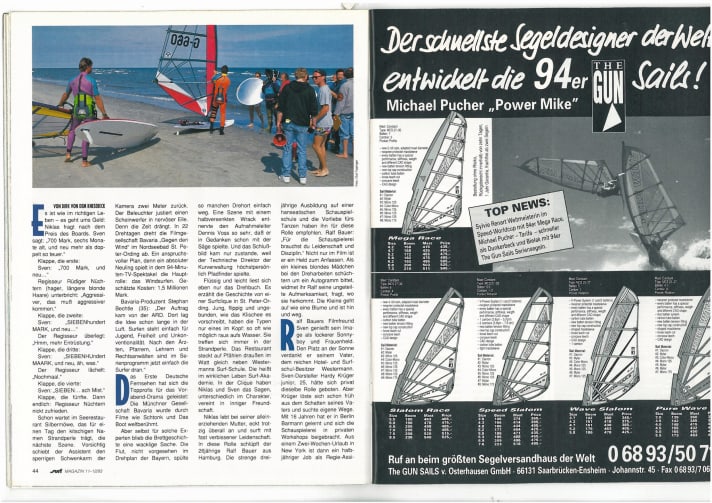
We were both at the start of our adult lives in our early or mid-20s with big goals - what you were playing, I was pursuing in real life, namely the goal of becoming a professional surfer. And of course you also had big goals in your business, in film. What are your achievements so far?
That was strange at some point, after "Against the Wind" was over, the goals had actually already been achieved...(thinks). It was a very strange thing. I wanted to be a presenter, I wanted to act, I wanted to be on stage, I wanted to do film, television and all that had already been achieved by the end of the 90s. And then something new was basically on the horizon, but I only realised it much later: That I wanted to produce myself. That only happened now with this film, but it had actually been in the air since 2000/2001 and all that was missing was the right push.
What happened in the meantime?
Basically, things have always gone very well for me. I've been in this business for all these years now and I've only had to rely on the job centre once, for two months. And that was before "Against the Wind". The two months of idle time between the start of filming the series and my time as a Disney Club presenter, which I put to good use, by the way: In Venezuela, Isla de Coche, to practise the water start. The trainer, Wolfhart Smidt, told me back then that if you can do it, nothing can happen to you... So, things actually always went well professionally, toi, toi, toi. However, I also have to say that the acting training I did naturally carried me a lot. Because I started acting in theatre in 1999 - it just suited me. I played Faust in Frankfurt back then, in the Goethe year. A whole series of films and theatre followed, more than 50 productions in total. Eight years ago, the casting director from the Disney Club brought me the old press kit to a party to celebrate my 22nd anniversary on stage, and in a CV that I had filled out in my early 20s, it said I wanted to be a professional theatre actor.
It's certainly not easy to produce a film yourself at the moment due to the coronavirus.
I walked around pregnant with this idea for a very long time. And then in 2018 I said, okay, if I don't start filming now, it won't work out. Looking back now, I can only say that I was right... travelling to India is simply impossible due to coronavirus, let alone shooting under normal conditions.
And with your first own film, you went back to surfing. What good and bad memories do you associate with it?
Well, putting on neoprene wasn't one of my favourite things to do in "Against the Wind" because I simply had to wear this orange neoprene on the beach for too long in the middle of summer. And sometimes I was frustrated because the wind was really hot during beach scenes and I wasn't allowed on the water. One of my best memories is a surfing holiday later on in Kos, at the Robinson Club. There was sensational wind, I was able to stalk, that was... when you start gliding like that for the first time and you feel like you're flying over the waves... hmm... that's something totally exhilarating. It's also difficult to explain to people who have never been windsurfing or haven't got beyond a certain level. But it's fascinating. Yes, it's an addictive feeling. And once you've experienced it, I forget that I'm wearing a wetsuit (laughs).
I can subscribe to that 100%. I still remember my first time gliding when I was 12 or 13. And I've been at it ever since, only when our children were small did I cut back a bit. And now they're on the water with me... Have you never considered having children?
I don't have any children. Because I've been travelling a lot, it's never really been an issue. Although, I love children. I'll put it this way: what isn't can still be. You know, when you're an actor, you're dependent on so many factors, you're always on call somehow. Of course, that's always a bit difficult with a family. It's a bit like you: you go windsurfing when the wind is there. And I have to work when there are jobs. Hmm... and then of course you have to find a wife who can cope with it all - the chaos (laughs).
You also do yoga and even teach it. How did you get into it and why?
I had back problems early on, in my late 20s, even when I was filming in St Peter's, which could often only be alleviated with an injection. And I was always looking for a solution and a sport that I could do regardless of space, time and place. And at some point during a film shoot in Tahiti, there was a German yoga teacher who showed me a sequence of exercises. After practising it for weeks, I noticed that my back pain stopped. And that's why I stayed loyal to yoga.
You once said that yoga also helps you to know where you come from and where you want to go. Where do you want to go?
Produce more yourself. And if things go well, use the results as a source of inspiration for young people.
You also address environmental issues. You mentioned that "The Return" is also about an investment that is apparently opposed to the surfer's paradise. In St. Peter-Ording, the issue of "tourism growth versus nature" is more realistic than ever - there was a petition against a hotel project in the dunes.
I didn't realise that when I was working on the script. What I used in the film, inspired by reality, was the fire at the surf school in St. Peter some time ago. But I only realised about this dispute over the hotel complex when we were filming up there. Sometimes it's frightening what is done for financial reasons, simply to increase the price or to make the shares look even better. There's a surfer saying that I just love: it's better to cycle to the beach than drive a Porsche to the office. Especially now in the pandemic, this motto has become more important, where young people can't go out like we used to - just dance, meet up, without any problems, because you have to be afraid of bringing this corona virus home and infecting your parents or grandparents. These are developments where you learn to see and appreciate the elemental, the truly beautiful things the world has to offer. Sitting together with friends, in paradise with a campfire on the beach, these are such basic things.... and without throwing the rubbish into the sea afterwards. I once went snorkelling in Thailand and saw this plastic waste that I picked up, it was scary. When you see the food chains - from whales to humans - in which microplastics are now being detected, it's terrifying. And this development sometimes starts with rubbish left on the beach and continues with the construction of a hotel complex in the dunes. Unfortunately, if you take this further, sometimes what nature has given us is simply wiped away. For example, for filthy lucre that you can't eat. We often seem to find it difficult to maintain moderation. I hope that awareness of the importance of the environment, clean air and healthy food will continue to grow despite the pandemic.
You had to be creative to bring "The Return" to the people, partly because of the coronavirus.
Because we didn't know exactly how and when things would continue with the cinemas, we decided to present the film online. If the planned additional drive-in cinema tour works out, I'll be very happy. Because I believe that "The Return" calls for direct communication with people and I can well imagine answering questions about it in front of a live audience. Because in addition to the lightness of surfing, beach life, "letting off steam on the water" and feeling the laws of nature on your own body, the film also addresses another world in a pleasant way: The political, the difficult, when people are treated badly, for example in order to exploit natural resources. It is a basic idea of the film that, as in any normal life - like mine, for example - you can also have the heaviness alongside the lightness. But even in this heaviness, you try to maintain a lightness.
Thank you, Ralf, good luck!
You know, what you said earlier, that the series or a surf film inspires people to surf, that's the best thing that can happen. That would be a success.
What it was really like back then
St. Peter-Ording as a surfer's paradise already flickered into the living rooms of millions of viewers in the mid-1990s as the early evening series "Against the Wind" with Ralf Bauer. The concept was simple: a young group of surfers go through thick and thin on their way to becoming professional surfers. And it had real-life role models: The joint "Surf Academy" training group based in St Peter at the time pursued precisely this goal. At the age of 16, Christian Kohl was one of the first "academics", lived in Friesenhaus Frisia, which was also the home of Ralf Bauer's film character Nik in the pilot film, and had the sail number 660, which Nik also sailed in the pilot film.
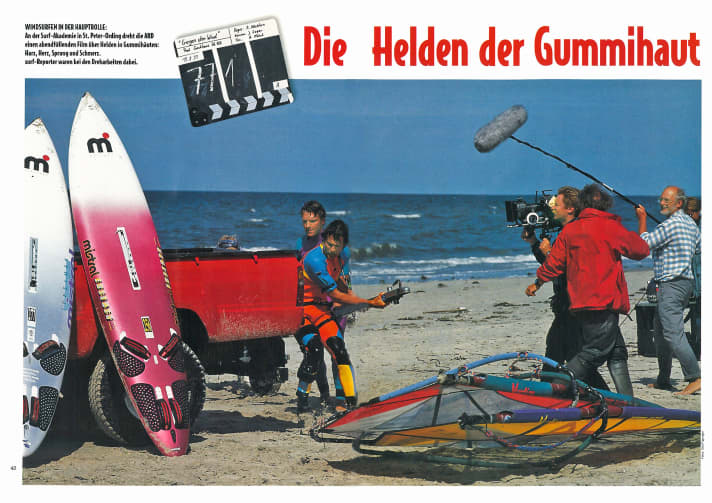
The beach and the film surf school were practically the "living room" of the real St. Peter clique. "Ralf was actually impersonating me, I always thought back then," says Kohl. "We were the real thing". Kohl's greatest competition success was the German Slalom Championship title in 1996 and he raced in the World Cup for three years. "Of course, the storyline in the series was exaggerated beyond belief, but we recognised ourselves in some parts. The will to make it as a professional surfer was the common thread in real life and in the film," says Kohl. On the other hand, the fact that the TV surfers had new girlfriends every fortnight was of course only due to the dramaturgy of the series. "Pure fiction," says Kohl. But the real love of surfing was evident in the series. Kohl's love of surfing continues and he pursues this passion on the North and Baltic Seas during storms - as long as his serious job as Head of Public Relations at the Schleswig-Holstein Ministry of Health and Family Affairs allows.

